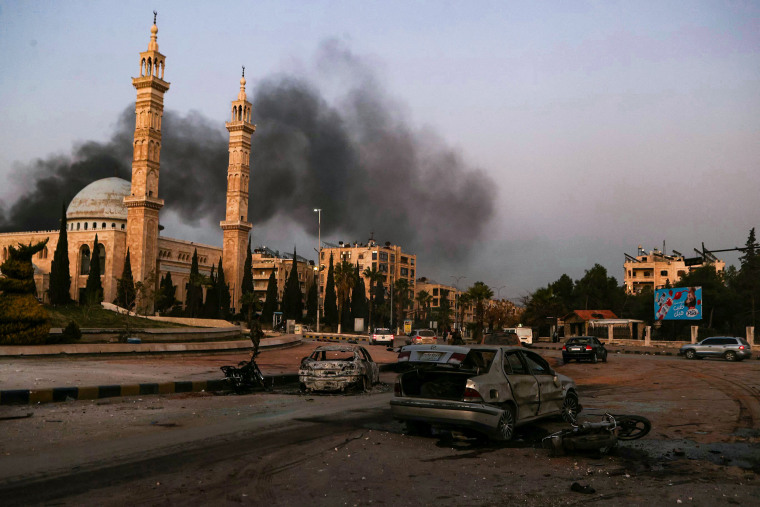
a group of cars in a parking lot with black smoke coming out of them
The recent developments in Syria have marked a significant turning point in the country’s protracted civil war, culminating in the overthrow of President Bashar al-Assad after nearly 14 years of brutal conflict. As opposition forces rapidly advanced towards the capital, Damascus, they declared the end of Assad’s rule, a moment that has reverberated across the region and the world. This article will delve into the events leading up to this dramatic shift, the implications for Syria and its people, and the broader geopolitical consequences.
Table of Contents
The Build-Up to the Offensive
The offensive against Assad’s regime began on November 27, 2024, when a coalition of armed opposition groups launched a coordinated attack across multiple fronts. This coalition included Hayat Tahrir al-Sham (HTS) and other factions of the Syrian National Army (SNA), who aimed to capitalize on the deteriorating military and political situation of Assad’s forces. Reports indicate that internal dissent within the Syrian military had reached critical levels, with many soldiers expressing grievances about their commanders and the overall direction of the war effort.
Internal Decay of Assad’s Military
For years, Assad’s military had relied heavily on support from foreign allies such as Russia and Iran. However, as these countries shifted their focus—Russia due to its ongoing conflict in Ukraine and Iran grappling with economic sanctions—the Syrian military found itself increasingly isolated. Morale plummeted among troops who felt abandoned by their leadership and foreign backers. This internal decay was evident as many soldiers chose to abandon their posts rather than confront advancing rebel forces.
The Capture of Damascus
On December 8, 2024, opposition forces successfully entered Damascus, claiming control over key state institutions and military installations. Reports emerged that President Assad had fled the capital shortly before rebels infiltrated the city. His departure was confirmed by Prime Minister Mohammed Ghazi al-Jalali, who stated he lost contact with Assad and acknowledged that the regime was no longer in control.
The Role of Rebel Forces
The rapid advance of rebel forces was facilitated by strategic planning and coordination among various factions. The HTS played a pivotal role in leading the offensive, which saw them capture significant territories including Aleppo and Homs before setting their sights on Damascus. The rebels’ ability to unite under a common cause against Assad was instrumental in their success.
Public Reaction
As news broke of Assad’s flight from Damascus, celebrations erupted among opposition supporters both within Syria and in exile. Many viewed this moment as a long-awaited victory against a regime known for its brutal repression and human rights abuses. However, there were also concerns about what this shift in power would mean for Syria’s future stability.
Implications for Syria
The fall of Bashar al-Assad represents not only a significant political shift but also poses profound challenges for Syria moving forward. The country has been ravaged by nearly 14 years of civil war, leaving millions displaced and infrastructure in ruins. As various factions vie for power in the post-Assad landscape, questions arise regarding governance, security, and reconciliation.
Formation of a New Government
In the aftermath of Assad’s departure, leaders from various opposition groups have begun discussions about forming a new government. HTS leader Abu Mohammed al-Golani called for fighters to return to their bases and lay down arms to establish order as institutions prepare to resume services. There is hope among some factions that a transitional government can be formed to ensure stability and address urgent humanitarian needs.
Human Rights Concerns
While many celebrate Assad’s downfall, there are fears regarding potential reprisals against those perceived as loyalists to his regime. Human Rights Watch has urged new leadership to uphold human rights standards and ensure accountability for past abuses committed by both Assad’s government and opposition groups during the conflict.
Geopolitical Consequences
The overthrow of Assad has far-reaching implications beyond Syria’s borders. For years, Assad’s regime has been a focal point in Middle Eastern geopolitics, with alliances drawn between various state and non-state actors based on support or opposition to his rule.
Impact on Regional Alliances
The loss of Assad could shift power dynamics within the region. Iran’s influence may wane as it loses its primary ally in Syria while facing economic challenges at home. Conversely, Sunni-majority countries may see this as an opportunity to bolster their influence over a post-Assad Syria.
Israel’s Concerns
Israel has closely monitored developments in Syria due to security concerns regarding Iranian entrenchment near its borders. Following the recent upheaval, Israeli officials have expressed apprehension about potential instability spilling over into their territory or extremist groups gaining ground in Syria.
Conclusion: A New Chapter for Syria?
As Syria stands on the brink of a new chapter following Bashar al-Assad’s departure, it faces immense challenges ahead. The path toward rebuilding will require not only political unity among diverse factions but also addressing humanitarian crises that have persisted throughout the conflict.
The international community will play a crucial role in shaping Syria’s future by providing necessary aid while encouraging dialogue among opposing factions. Ultimately, whether this moment marks a true turning point for peace or simply ushers in another phase of conflict remains uncertain.
In summary, while many celebrate the end of Assad’s rule as a victory for freedom and justice, it is essential to remain vigilant about what lies ahead for Syria—a country yearning for stability after years of turmoil.





